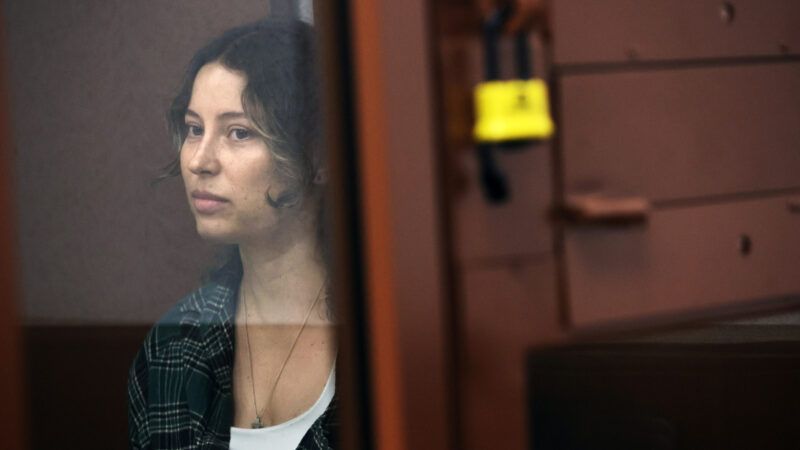Russian Court Denies Appeal of U.S. Citizen Sentenced to 12 Years for Donating $51 to Pro-Ukraine Charity
Ksenia Karelina was prosecuted as part of a larger “treason” crackdown that is unprecedented even by Russia’s illiberal standards.

A Russian court on Monday denied relief to a U.S. citizen serving 12 years in a penal colony for treason in connection with a $51.80 donation she made, while in the U.S., to a pro-Ukraine charity.
Ksenia Karelina, who is also a Russian citizen, was arrested in January during a trip to visit her 90-year-old grandmother and other family members in Yekaterinburg, Russia. She immigrated to the U.S. in 2012 and became a citizen in 2021.
Trouble for Karelina, 33, began shortly after landing in Russia, where the Federal Security Service (FSB) flagged her after learning she had a U.S. passport. The agency interrogated her, took her cell phone—on which the FSB discovered her 2022 donation to Razom, a charity dedicated to "actively contributing to the establishment of a secure, prosperous, and democratic Ukraine"—and ultimately arrested her for "petty hooliganism," which was later ratcheted up to treason. Her prosecution is part of a larger Russian crackdown on alleged treason that is unprecedented even by the country's illiberal standards.
Following a closed-door trial, Russian Judge Andrei Mineev handed down the 12-year sentence on August 15. Mineev is the same jurist who oversaw the case of Evan Gershkovich, a reporter at The Wall Street Journal who was detained in Russia in March 2023 and who received a 16-year sentence as part of a bogus espionage case.
Karelina's punishment was imposed shortly after the execution of the large U.S.-Russia prisoner swap, which included Gershkovich; Paul Whelan, a former U.S. Marine who was arrested in December 2018 and also convicted of espionage; Alsu Kurmasheva, a Russian-American journalist for Radio Free Europe who was detained in October 2023 and charged with failing to register as a foreign agent; and Vladimir Kara-Murza, a permanent U.S. resident who was sentenced to 25 years in prison for treason in connection with his unflinching criticism of Russian President Vladimir Putin and his government.
But Karelina was not so lucky. Chris van Heerden, her boyfriend, said he has urged the federal government to classify Karelina as wrongfully detained—a designation that can take a bafflingly long time to obtain. "I was pushing for the last eight months, I was pushing for a wrongful detention so that when we do have a prison swap, that [Ksenia's] on that list and made, made a priority," he told CBS News in August. "I was slowed down. I was told we have time. I was told, 'Chris, don't worry.' There will be no prison swap until after the election or maybe early next year. So we have time and I was pushing, but I was pushed back. Guess what? There was a prison swap two weeks ago. And Ksenia was not on that list."
In December 2022, in exchange for arms dealer Viktor Bout, Russia also released Brittney Griner; the WNBA player had been sentenced to nearly a decade in prison after authorities found 0.4 ounces of hash oil in her luggage at the airport. The high-profile case drew a fairly swift response from the U.S. government. But there are several Americans still incarcerated in Russian prisons whose names you might not know. That list includes Marc Fogel, a teacher in his 60s who was arrested in August 2021 and sentenced to 14 years in prison for having 0.6 ounces of medical marijuana that he was prescribed in the States.
Griner's case attracted a level of media attention and national interest that people like Karelina and Fogel have not been fortunate enough to receive. Her celebrity appeared to spur President Joe Biden to act, as he secured her release after she spent about 10 months in prison. Her freedom was good news. But meanwhile, despite the parallels between their cases, Fogel had still not been classified as wrongfully detained in August of this year.
"That hurt," he wrote in a letter to his wife, Jane, referencing the Griner prisoner swap. "Teachers are at least as important as bballers."
Speaking to the media shortly after he'd obtained his freedom, Whelan had a message for those still trapped in Russian custody: "Just hang in there," he said. "We're coming for you." Hopefully he is correct.


Show Comments (11)